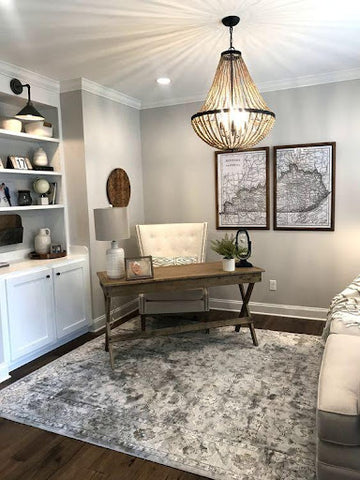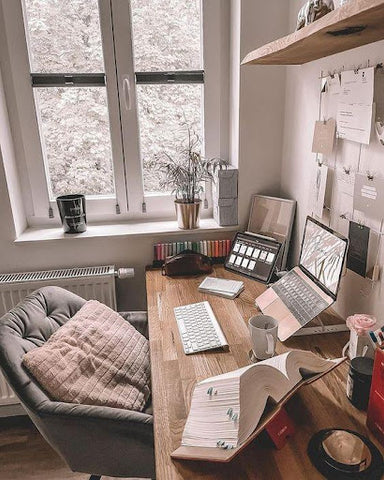As someone who has an office type of job, I deeply understand the struggle of not having a comfortable area to work. It is very overwhelming to decide where to place your desk in a room especially when you have limited space. One of the most common feng shui mistake people do is placing their desks in a position where they face the wall.
You might be wondering why it is not accepted in feng shui but I am here to tell you all about it. If this news frustrates you, let me tell you; when I first heard about this too, I had a hard time believing it!
Is your desk facing a wall too? Do not worry because I’ve looked up and listed down some solutions so you do not have to! But first, let us talk about:
Why People Tend to Face Their Desk on a Wall
A lot of people love to have their working desks placed against the wall and honestly, I can’t blame them. I personally love working on a desk that is placed in a fashion where all you can see when working on the wall. Actually, there might be a bunch of reasons why other people prefer this placement.
Some of these reasons are the sense of focus it provides, the ability to hang shelves or artwork above the desk for inspiration, and the efficient use of space. Choose a corporate interior design, and consider factors like these that can greatly enhance productivity and comfort in the workplace.
Some other reasons are:
It Saves Space

Placing your working desk in a corner helps in saving space. The usual shape of working desks is rectangular and that is probably why we love it pushed against the wall. It is very hard to decide where to place your desk even when you have a separate room from your office, how much more if you only have your bedroom to spare? If you have your working area inside your bedroom then you probably had no choice but to install your working table in the corner where it’s facing the wall and out of the way.
For maximizing comfort and functionality in such setups, investing in the best adjustable height desk can be a game-changer.
Stimulates Focus
With nothing else in front of you but your computer and a wall, you get to work with a lot more focus. This is because you see no other movement rather than what you are working on. In addition, situating yourself in front of a wall keeps you away from the distractions around the room. Other people inside the room will subconsciously avoid talking to you as it is hard to interact with you on your back.
Helps With Storage

Placing your office desk against a wall creates the opportunity for storage spaces beneath your desk. Unlike when you have your table facing the room in the center, you will likely not want to store anything beneath your table as it will look cluttered and messy. Opting to place your desk in front of the wall is like having a desk and a storage space combined.
Why Feng Shui Says No and What You Can Do About It
According to Feng Shui, working at a desk that is facing a wall will result in many obstacles coming your way through your career. This is equivalent to voluntarily boxing yourself away from opportunities and success. It also discourages creativity and inspiration. Moreover, facing the same boring wall while working can make your work seem monotonous and tiring. Lastly, facing a wall while working means you have your back around your room making you unaware of whoever goes in and out. We all know how important it is for the desk to be in a command position at all times.
However, as your feng shui friend, I came here prepared with all the solutions you may apply to avoid this from happening. Here are the remedies you may try if your office desk is facing a wall.
Move It!
The very first suggestion I will give you is to try and move your desk around your room. If you are lucky enough to have a separate room for your working area then this solution might work for you.

The position of your desk must be in a “kitty-corner” from the door. This means that you will be able to see the door if you were to sit down at your desk. Basically, you will be facing the room overlooking the door but not directly toward it. If this is not possible then try applying the next solution that I’ve tackled for you.
Use a Mirror
If there is not enough space to position your desk facing the room while not being directly placed towards the door, then try using a mirror. Place a mirror in a position where it allows you to see the door from your desk. Bear in mind that the mirror must not be placed directly in the direction through the door but rather diagonal. If it is impossible to place your desk directly to the door you may also hang a crystal ball on your door.
Rely on Arts
You can also add paintings to your wall to cure its insufficiency of motivation. Choose artworks that can awaken your creativity or a picture of something that inspires you. Make sure to select artwork with a scenic view and avoid those which depict doldrums and depression. It is also good to place motivational quotes and sayings.
Add Plants
Another way to bring life to your working area is by adding feng shui indoor plants, especially green ones. Green plants are believed to portray a symbol of prosperity. Choose plants that are claimed to be lucky in feng shui such as a jade plant, an english ivy, or a rosemary plant.
Final Thoughts
Your work desk is more important than you think it is. It is the area where you work on building your career, advancing your business, and formulating your way to success. Thus, it is crucial to make sure that your office space is surrounded by good feng shui.
Do not let a small but common mistake ruin everything that you are looking forward to in life. Make your move and make your working space in the best feng shui condition as it could be the only reason why you feel disconnected and unaligned toward success. Get more feng shui tips from our blog!





